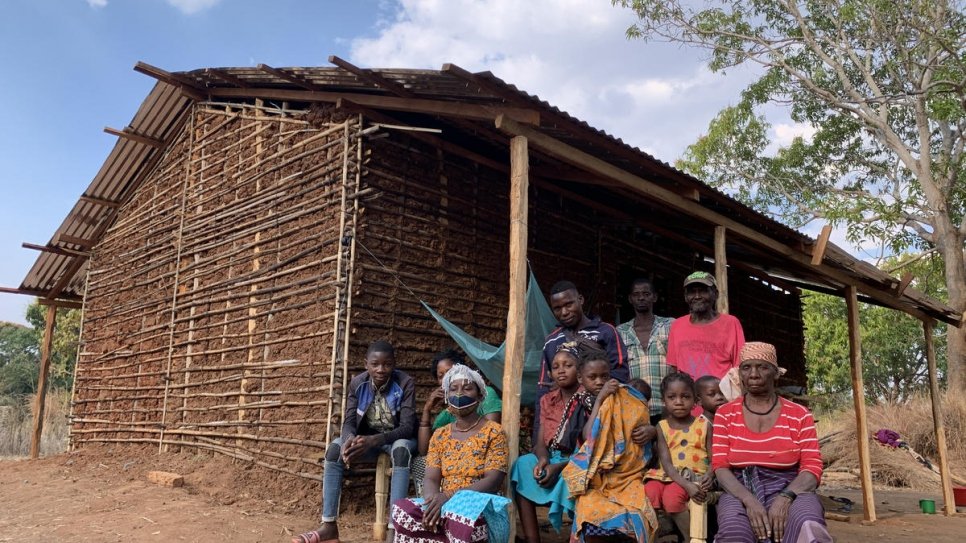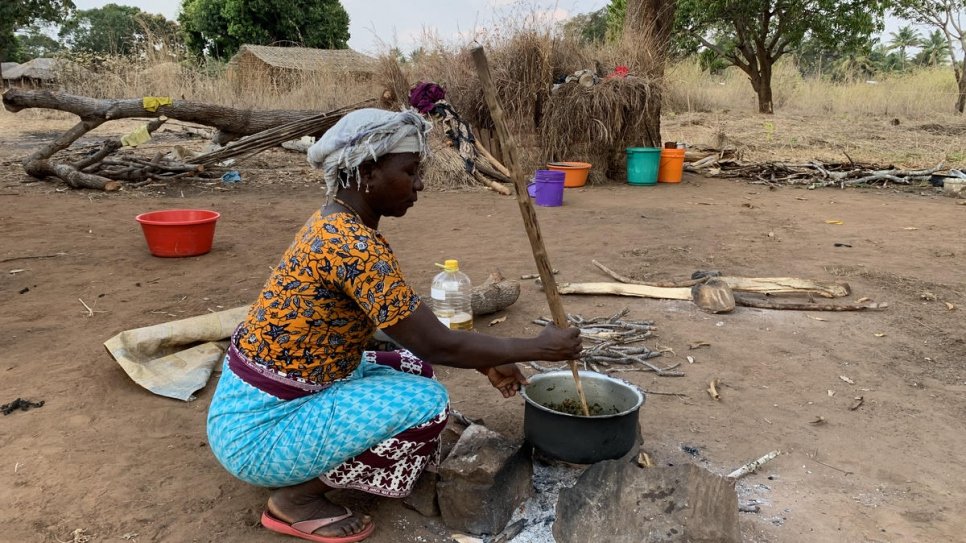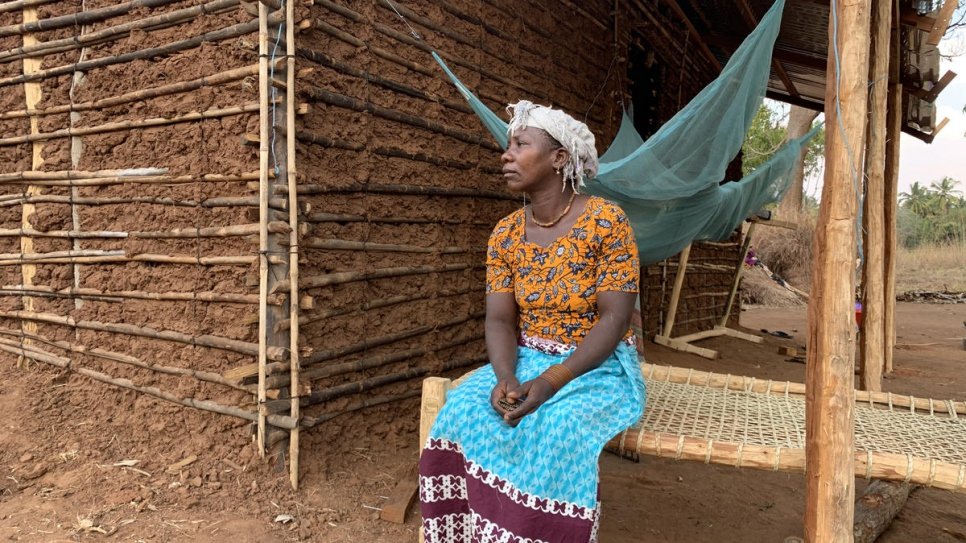As attacks surge in northern Mozambique, families flee multiple times
Violence by armed groups has uprooted more than 250,000 people since 2017 in Cabo Delgado, with many living in dire conditions as they seek safety.
Joaquina* stands outside her brother's home in Montepuez after fleeing violent attacks in northern Mozambique.
© UNHCR/Deiliany Souza
Grandmother Joaquina* was asleep when armed militants slipped into her village in northern Mozambique at around 4 a.m. and opened fire.
“We woke up to the sounds of our neighbours’ screams and gunshots,” explains the shaken 41-year-old.
Flames tuned the night sky orange. As the militants started torching homes in their village, she and her two daughters and two granddaughters dressed hastily and fled to the bush.
“When we returned to our village the next morning, we found our house had been completely burned. There was nothing left,” she recalls.
The best chance of safety, she reasoned, would be outside the immediate area. She took her family to stay at a friend’s home a few miles away but the attackers were not far behind. After a few days, the insurgents stormed that village, burned houses and killed several inhabitants.
For a third time, Joaquina’s family fled to another village where they once again witnessed a new attack and decided this time to seek safety further south of the province. They relied on people they met along the way for a place to sleep for one or two nights and what little food or water they could provide.
“We walked for two days, without anything to eat, asking for help wherever we stopped,” recalls Joaquina. “Sometimes we had to run because we were too afraid to get caught in new attacks. My legs were swollen from walking and running.”
“They were very traumatised by what they saw during the attacks. People were killed in front of their eyes.”
The multiple attacks were particularly harsh on the children.
“They were very traumatised by what they saw during the attacks. People were killed in front of their eyes,” she adds.
UNHCR is alarmed by the attacks in Cabo Delgado province where civilians like Joaquina and her family have been displaced and others killed. Villages have been attacked and looted, houses and crops burnt and destroyed and infrastructure has been damaged.
The northern region has been facing such attacks by armed groups since 2017 which, to date, have uprooted more than 250,000 civilians, according to OCHA, the UN Office for the Coordination of Humanitarian Affairs’ figures. Most remain within the province itself.
Families like Issa’s* fled with nothing and now rely on the generosity of the local communities hosting him and thousands more.
“After what I saw in my native land, I do not want to return,” he says. “If I can find a house and have a job to support my family, we can live a normal life.”
One of the local hosts agrees, urging the local authorities and aid agencies to provide more support.
“They should not only offer food but also provide jobs, farm land and housing. This way, there will be more production,” he says.
So far, majority of the displaced are hosted by relatives or friends in more stable areas. Accommodation is scarce, with at times 20 to 30 people living under the same roof. The situation may worsen as displaced people have fled into neighbouring Nampula and Niassa Provinces.
The financial requirements for the IDP operation will likely increase as the situation in Cabo Delgado evolves.
The province is still recovering from the impact of Cyclone Kenneth which made landfall last April, affecting hundreds of thousands of people. It was also impacted by heavy rains last December and this January – several bridges collapsed and houses were damaged or destroyed. The upcoming rainy season from November to April may further reduce access to some affected areas and the COVID-19 situation is seriously hampering activities on the ground and deployment of aid workers.
“We have to stay and deliver to the most vulnerable, despite the volatile security situation.”
UNHCR has been working with partner agencies since last year to provide basic assistance to the displaced, including distributing household items like sleeping mats, kitchen sets, jerry cans and blankets.
“We have assisted 6,500 displaced people including their hosts. We have to stay and deliver to the most vulnerable, despite the volatile security situation,” says Samuel Chakwera, UNHCR’s Representative in Mozambique.
He adds that UNHCR and other protection agencies are focusing on the most vulnerable, identifying critical needs and ensuring access to basic rights. Through a network of partner agencies, the displaced are referred to available services for assistance while UNHCR works on addressing possible gaps identified during interactions with IDPs.
Joaquina and her family are now at her brother’s home in Montepuez, after he fled his village following attacks, some months ago. For the time being, she has simple dreams.
“I used to cultivate sesame, corn and cassava so I would like to have some land to work on,” she says. “But more importantly, my wish is for the conflict to end soon. I want to return to my village. If everyone returns, then I can go back.”
Internal displacement is rising worldwide. Last year, 45.7 million people had fled to other areas of their own countries, according to UNHCR figures.
*Names have been changed for protection purposes



